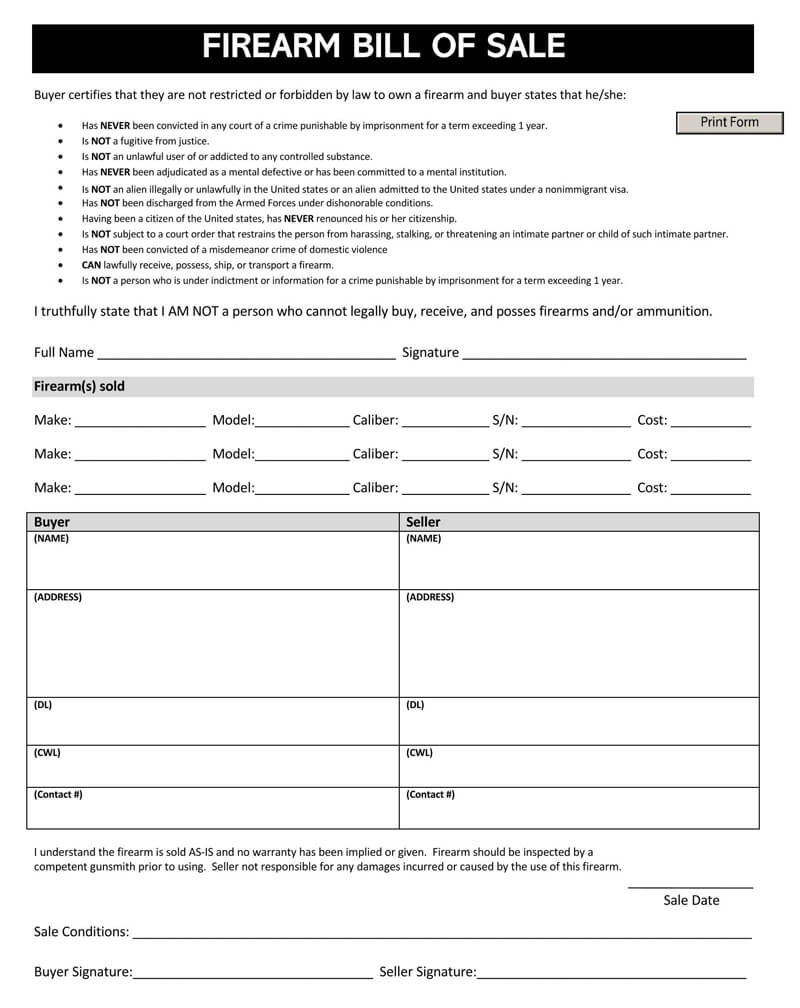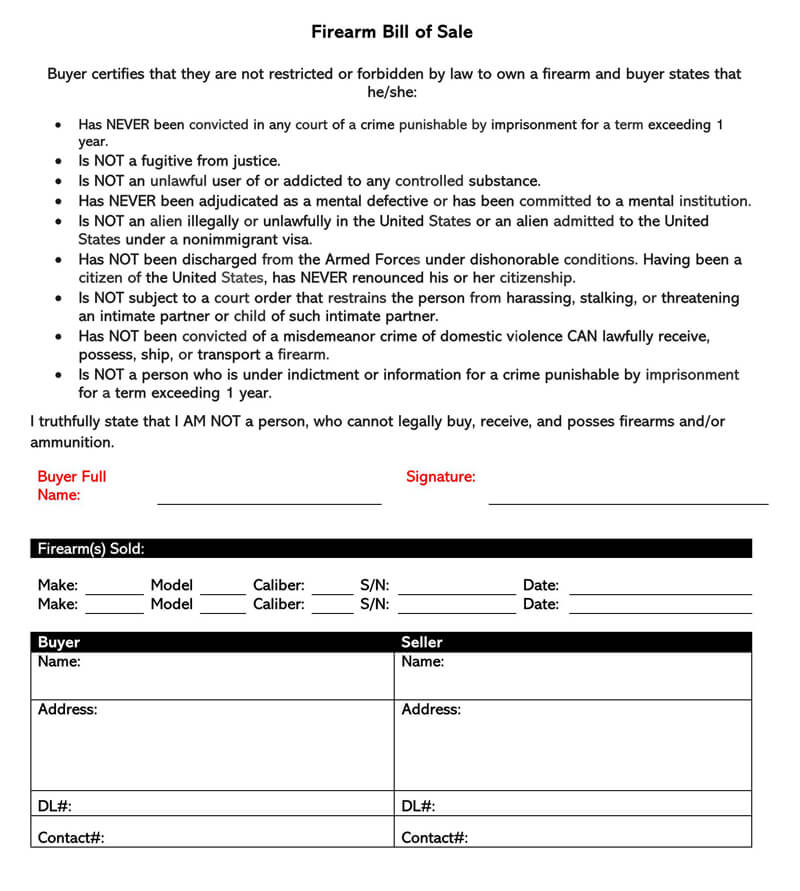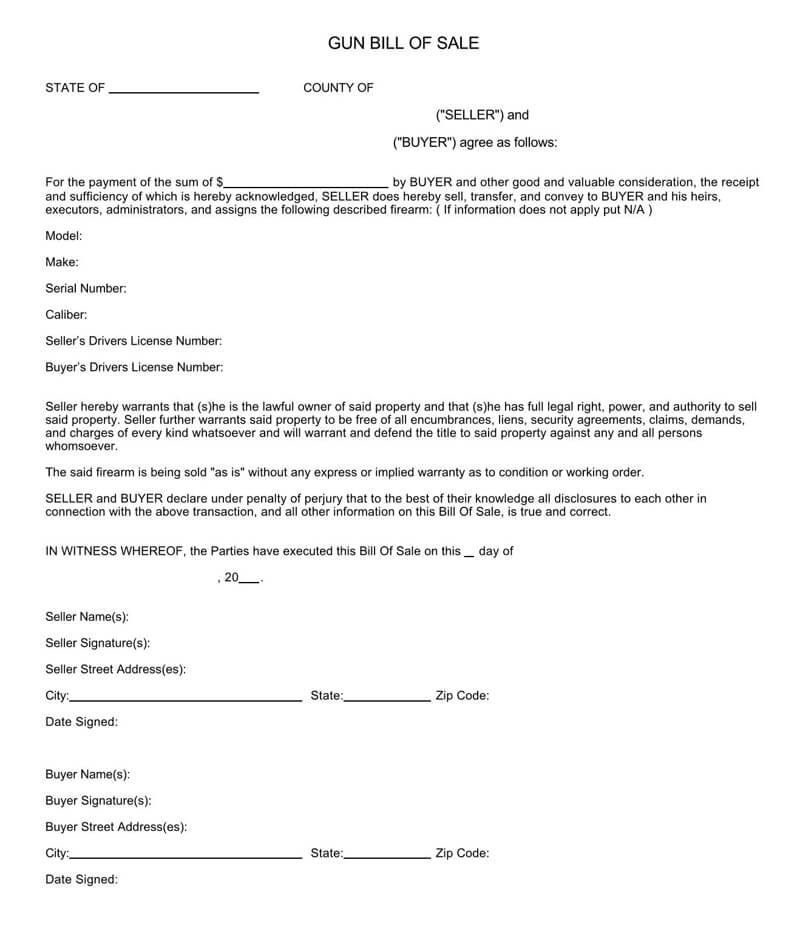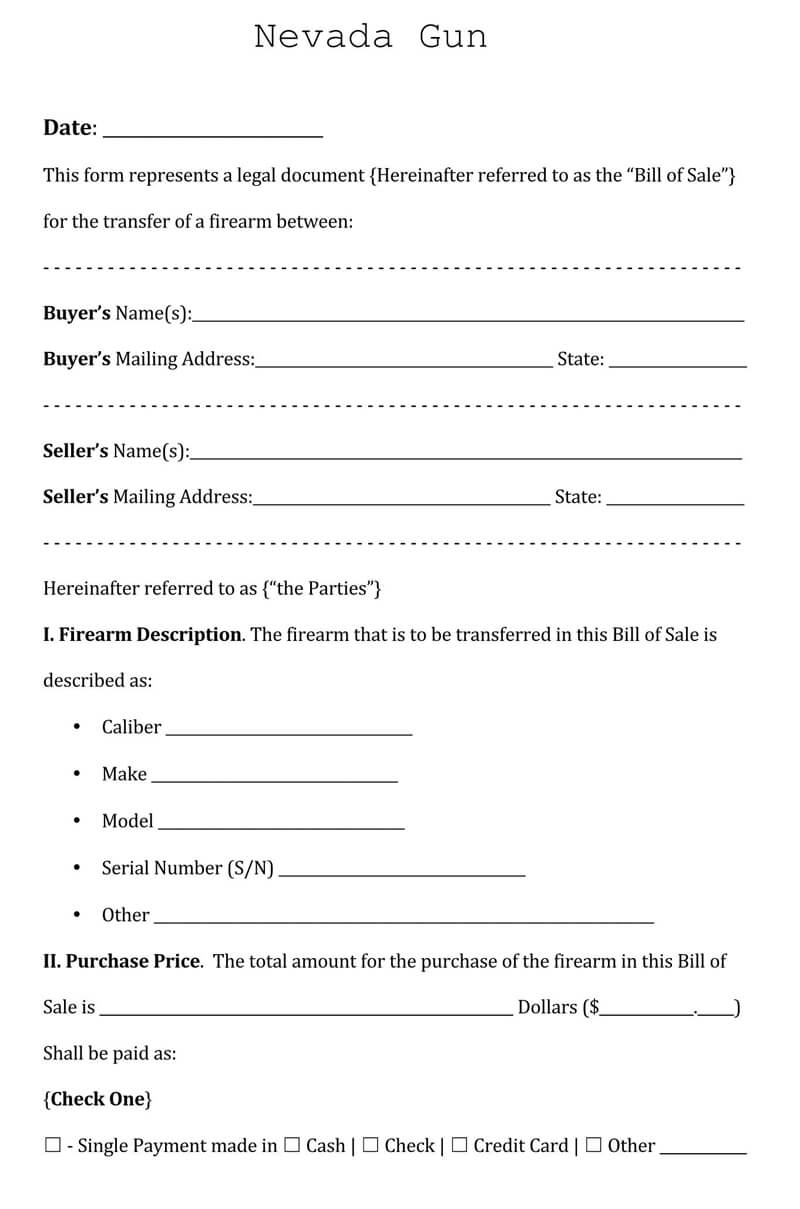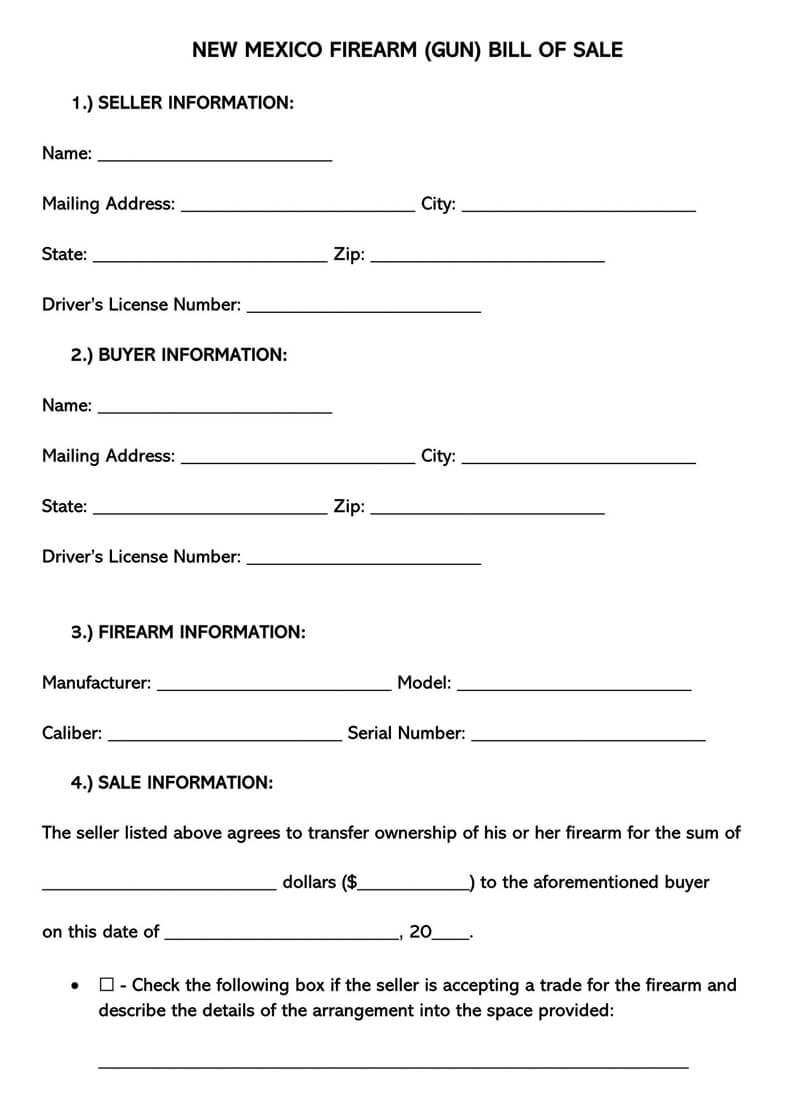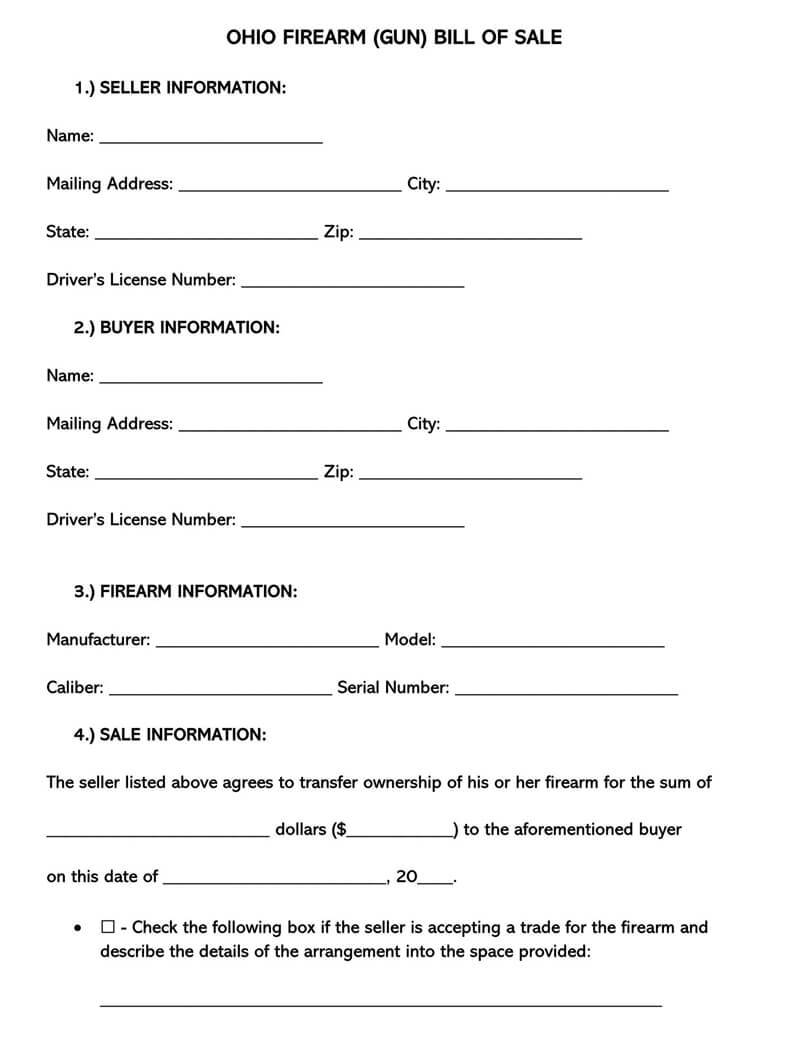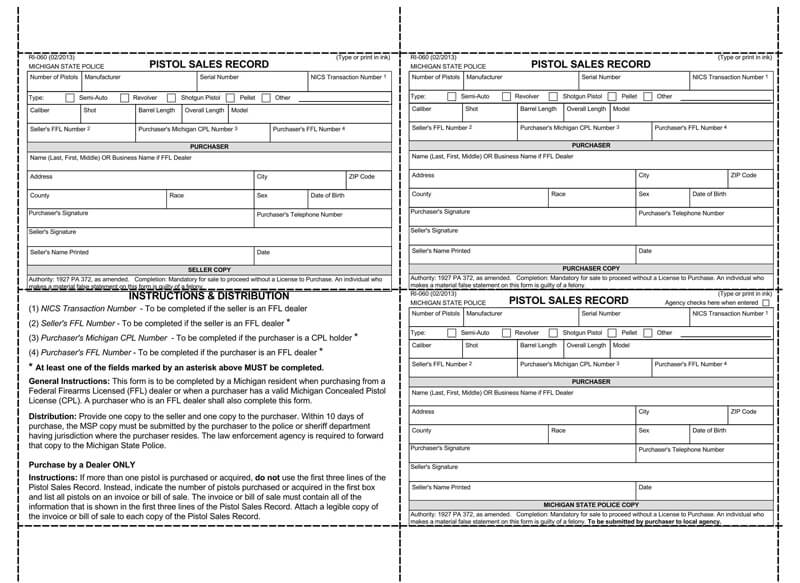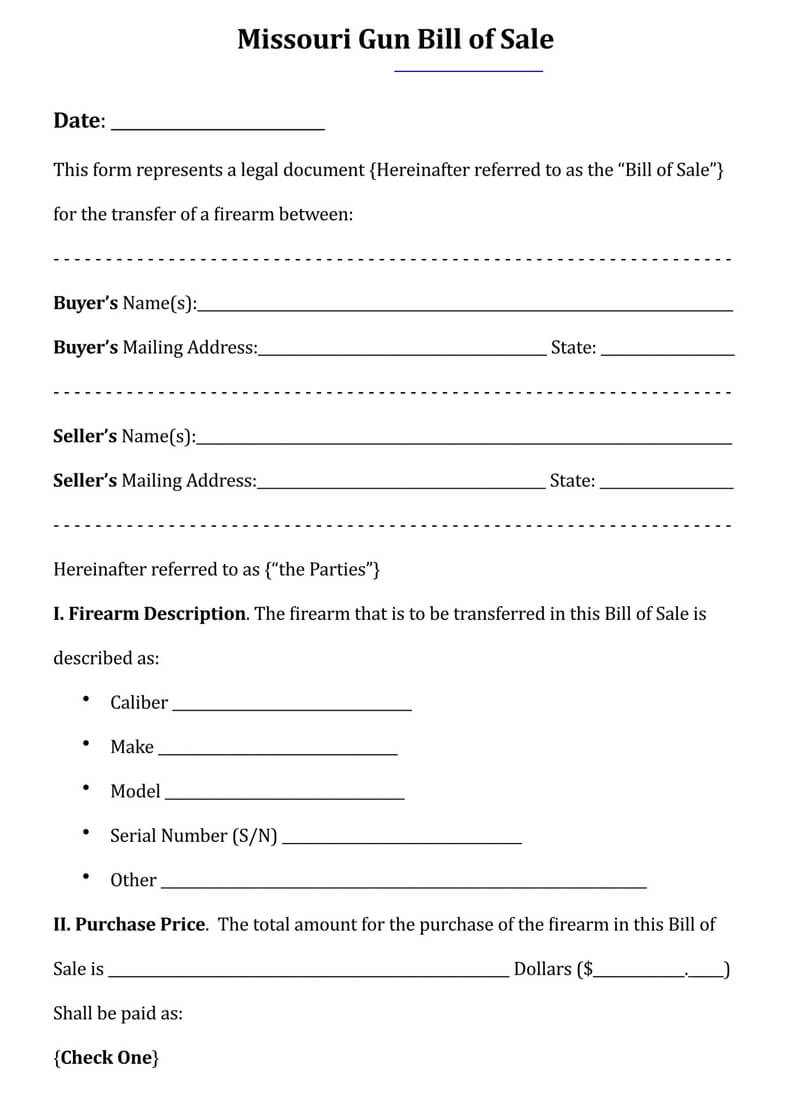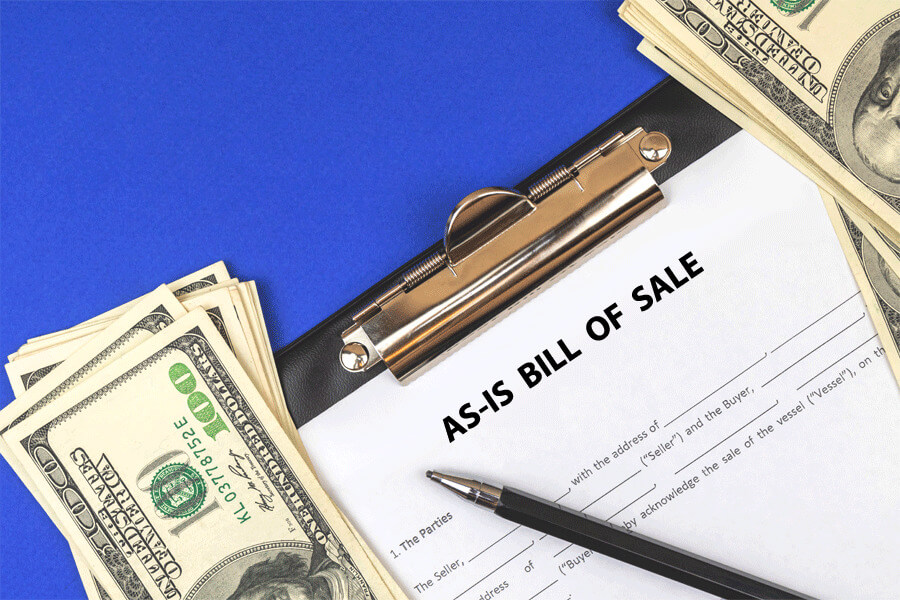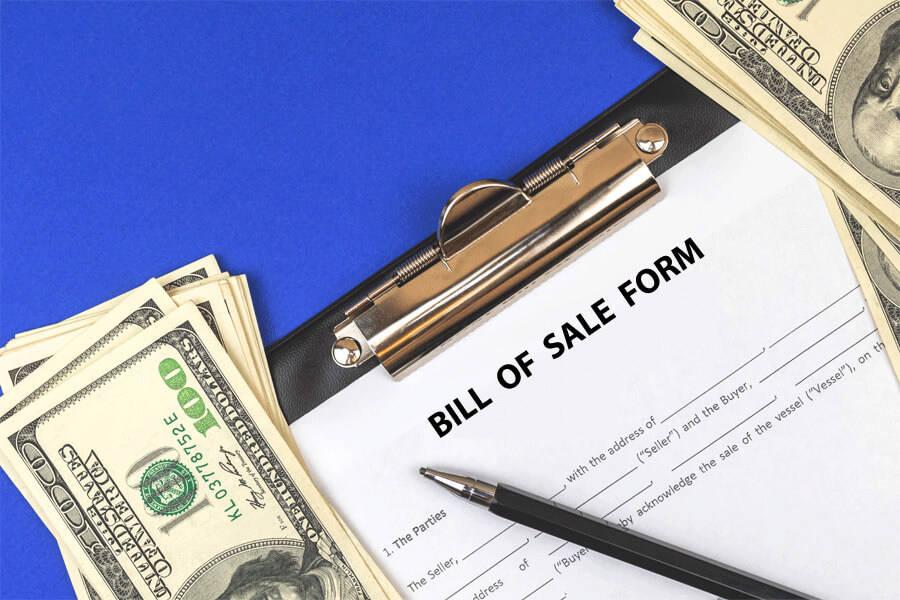A bill of sale is a legal document or form that records the transaction and change of ownership of a firearm from a seller to a buyer.
It contains the details of the gun on sale, payment information, and the buyer’s and seller’s signature and contact information.
It is proof that an exchange of gun ownership has occurred. A seller is responsible for ensuring the buyer has no criminal history because the liabilities likely to incur for the sale of a personal firearm are different from those of purchases made at a dealer or gun show.
Free Firearm Bill of Sale Forms
Pre-Selling Things to Know
The seller must be aware of the following information before beginning the process of selling their firearm:
Federal firearms license
Gun shops and businesses that legitimately sell, manufacture, and move ammunition in the United States have a Federal-Firearm license. The federal firearm license comes with rules and regulations that can include background checks on gun buyers. The requirement to have this license to sell private firearms is determined by the seller’s state. The Federal-Firearm License is also required for the public and private sale of firearms across state lines.
Related Sources:
Concealed carry
Concealed carry is the practice of carrying a gun to or on one’s person or in a public place in a way that is hidden from surrounding observers. Most states in the United States only allow an individual to possess a concealed weapon after they obtain state and /or local permits. Concealed carry weapons are often obtained for the purpose of self-defense.
The state regulations on the issuance of a concealed carry permit fall into the following four categories:
- Unrestricted Jurisdiction: The regulation states that an individual does not need a permit to carry a concealed gun. The regulation applies in some unrestricted states, which allow their residents to go permitless, while others allow any non-prohibited person to carry a concealed gun regardless of their state of residency.
- Shall-issue Jurisdiction: The regulation states that only an individual that meets a set of laid criteria by law can be issued with a concealed weapon permit.
- May-issue Jurisdiction: The regulation states that the local authority may or may not grant a concealed carry permit to an individual who meets the state’s set criteria.
- No-issue Jurisdiction: The regulation prohibits individuals from carrying a concealed gun in public. However, such states do have some very limited exceptions.
Who should use a bill of sale?
It can be used by an individual that wants to privately sell their gun to a family member or friend. This form will be used as a receipt if both the buyer and the seller are unlicensed. Pawnbrokers and dealers can also use it to sell used guns so long as they have a Federal-Firearm License.
Selling a Firearm
A firearm seller or dealer must be fully aware of the process they should follow to sell a firearm. Understanding how to go about a firearm sale will speed up obtaining and filing this document. The following steps will guide the seller and buyer involved in the firearm transaction:
Check the state laws
Some states have restrictive laws that prevent the sale of firearms and the issuance of this form to just anyone. A state may require a buyer to have a permit or have the sale processed through authorized dealers, as is the case in California.
A state may also require the seller to conduct a thorough background check of the buyer before allowing any sale to go through. The buyer and the seller must consider any significant firearm sale laws that may hinder the exchange from taking place.
A seller can refer to their local Alcohol Tobacco and Firearm Office to clarify any unclear laws.
Examine the firearm
The seller should ensure that the firearm up for sale is not defective. The gun should be stripped, cleaned, re-lubricated, and inspected for damaged components. A seller should also consider buying new parts for a faulty gun to make more money off its sale.
Determine the price
A seller can determine the price of their handgun or rifle from sites that post prices of used firearms of the same make and model. The seller should ensure that they look through several sites to a least get an accurate price range.
Meet potential customers
A gun owner is free to sell their firearm to any suitable buyer so long as they meet the state requirements. However, the gun owner’s responsibility is to be cautious of the person they choose as the buyer. It is recommended that a gun owner consider individuals well known to them as friends, family, or neighbors. Where this is not possible, a seller should take cautionary measures of identifying their buyer before proceeding with any transaction.
The sale of a personal firearm can take place via various avenues such as:
- In-person: In-person sale is the most recommended avenue of gun sale, especially for states whose laws do not require background checks to sell private firearms. Face-to-face selling will give the seller an opportunity to determine if the buyer is trustworthy.
The in-person avenue is effective for both customers well known or not known to the seller. - Via a pawnshop: Pawnshops are also a great way to sell a used firearm this is because they valuate the gun, buy it from the seller and then resell it to a buyer. However, the seller must ensure that the pawnshop takes in used firearms in the first place.
The seller must also be aware that pawnshops usually buy the used weapon at a lower price and resell it at a higher value. - Online listing: Online listings of firearms are subject to state laws and require shipping by a Federal firearm License (FFL) holder. A seller can consider listing their gun online to find more customers. Suppose a sealer is able to secure an online buyer, then they must request the buyer’s FFL information to ensure due diligence is followed before shipping the gun.
Perform the background check
The seller should perform a criminal background check to ease any doubts they may have concerning the buyer. Background checks also prove that the seller took all precautionary measures to find an upstanding buyer in case a crime is committed using the firearm post-sale.
The seller should find out which avenues they can use to conduct the background check, including using licensed dealers, government agencies, and credible online sites.
Criminal Background Sites:
- CriminalWatchdog.com – $18.95
- SentryLink.com – $19.95
- BeenVerified.com – $26.89
Sex Offender Check:
Ask for a gun license or permit
A state may demand that a firearm purchaser have some kind of permit or license.
Obtaining a license will require the buyer to go through a background check and have basic training on using a firearm. The seller can request an unlicensed buyer to get a permit before agreeing to the sale. A buyer with a license to carry or a concealed carry permit is most likely to have a smooth purchasing process and the seller’s confidence.
Fill the bill of sale form
A seller satisfied with the information acquired from the buyer can finalize the transaction by filing a bill of sale. It contains all relevant transaction information along with the buyer and the seller’s details. It protects the seller from liability in case the firearm is used in a crime in the future while also acting as proof of the gun’s change of ownership.
Filling the Bill of Sale Form
For a firearm transaction to occur, the buyer and the seller must both be aware of how exactly the form should be filled to ensure that it meets all the legal standards. The process of filling it begins by providing the following information:
Filing date
The filing date of it should be the first information stated.
The parties
It should indicate the following information concerning the parties involved in the transaction:
- Buyer’s Name: The full names of the gun buyer should be printed in the slot allocated on the form. It will identify them as the individual purchasing the firearm (the new owner of the gun).
- Buyer’s Address: The buyer should indicate the legal address as stated in their state I.D. or driving license.
- Seller’s Name: Regardless of whether the seller of the firearm is an individual or a business entity, the full names of either dealer must be indicated in the allotted slot on the form. In addition, business entities are required to include the appropriate status suffix, that is, if they have any.
- Seller’s Address: Providing the seller’s legal or business address helps identify and locate them.
Firearm details
It is required to contain all the details of the firearm(s) involved in the transaction. The form has a maximum of three spaces for firearms that must all state the following characteristics:
- The firearm’s cost as agreed between the seller and the buyer
- The make of the firearm such as Winchester, Ruger, H&K, etc.
- The model of the gun such as 10/22, VP9SK, model 70
- The weapon’s method of loading ammunition in the chamber. Only one box should be checked from the options provided
- The type of ammunition that can be loaded in the firearm otherwise known as gauge or calibre, for example, 9mm,40S&W
- The stamp of the firearm’s serial number, which is unique to it
- The total cost of the firearm
It should also state the date of the firearm’s purchase, its sale price, and all payment arrangements, including full and initial down payments or installments.
Other information to be included in this section is:
- Type/Model: Visual inspection of the firearm or manufacturer’s information can identify the gun, for example, whether the gun is a shotgun or a hunting rifle. This information is crucial because it identifies what kind of weapon that has been sold.
- Caliber: A gun’s caliber is indicated in millimeters (mm). A firearms’ barrel diameter determines caliber. The caliber should be included in the form because it determines the type of bullets used in the gun.
- Serial Number (S.N.): A serial number is a mandatory requirement for a gun to have in many states to make it easily traceable. The number is often located on the gun’s handle, the slide, or trigger guard. It should also indicate both serial numbers of rebuilt guns with more than one number and their location on the weapon.
Purchase information
It must contain all payment information from the buyer. The detailed payment information includes the following:
- Payment Amount: The payment amount is the money the seller expects from the buyer to relinquish ownership of the gun. The full value or original asking price should be stated even when the seller has agreed to a trade-off in part or entirely as payment.
- Payment Date: The payment date is the buyer’s deadline to make payment for the firearm. The seller can indicate it as the same day as filing the form or any other day they deem convenient.
- Payment Options: Sellers are advised to request a form of payment that leads to a paper trail; however, this does not prevent them from accepting cash. Credit cards, money orders, checks, and wire transfers can all create traceable paper trails. Other forms of payment like property are also acceptable.
The seller is also expected to indicate information involving the fact that the gun has been gifted to the buyer or its prices have been slashed in an allotted checkbox in the bill of sale.
No warranty
The no warranty section of the form declares that both the buyer and seller have disclosed the information provided in the document to the best of their knowledge. It also states that the gun has been sold and accepted ‘as is’ without any warranty or guarantee expressed or implied.
Both parties can subsequently proceed to consent to all the information provided in it by providing buyer’s signature, buyer’s signature date and printed name, buyer’s driver’s license and issuing state, seller’s signature, seller’s signature date, and printed name and seller’s driver’s license and issuing state.
Notarization (if applicable)
The buyer and seller may decide to have their signatures notarized in a notary public; it provides an exclusive allotted spot for this to happen on the last page. Once completed, the original form goes home with the buyer, and the seller can opt to receive a copy of the bill.
State Laws
Conclusion
This document is critical in the sale of a firearm. Any individual that wants to sell their firearm should start by researching their state laws to ensure follow-through of all requirements. Additionally, with this form acting as proof of transfer of ownership, a seller is relieved of any liability the buyer may incur post-sale.
